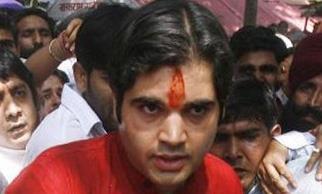
Lucknow, December 1: A court in Pilibhit district of UP has framed charges against BJP MP Varun Gandhi in one of the 2009 hate speech cases. Varun had allegedly made inflammatory comments against Muslims in his speeches at public meetings in Pilibhit during 2009 Lok Sabha election campaign.
The BJP leader has been booked under various sections of the Indian Penal Code and the People's Representative Act for promoting enmity and acts prejudicial to maintenance of harmony. The first FIR against Varun was lodged on March 17, 2009, at Barkhera police station for delivering inflammatory speech during a public meeting on March 8, 2009. The second FIR was lodged at Sadar Kotwali on March 18, 2009, again for allegedly making an inflammatory speech with communal overtones at Dalchand locality. The third FIR was lodged against Varun on March 28, 2009, when his supporters attacked the police after the court sent him for judicial custody.
The police have filed chargesheet in all the three cases. Charges in the case lodged at Barkhera police station were framed in May 2011. Now, the framing of charges has taken place in the case filed in Sadar Kotwali police station.
According to the police, Chief Judicial Magistrate Abdul Qyaum took cognizance of the chargesheet filed in Sada Kotwali police station in the presence of the BJP MP. The court has fixed December 10 and 11 as the next date of hearing. The court decided the charges against the MP on the basis of evidences produced by prosecutors in the matter. The court also directed the prosecutors to produce the witnesses in the matter.
The court also heard the 'Barkhera police station' case. A total of 10 witnesses were produced in the matter before the court. Of them, five witnesses testified in favour of Varun, while the others changed their statement they recorded with the police. The court has fixed the next hearing of the two cases on December 10 and 11.
Great-grandson of the country's first prime minister Jawaharlal Nehru, Varun had strongly denied the charges and termed the case as an attempt to malign his image. He had claimed that in one instance he was referring to bad elements and in the second one, the tapes have been doctored. The cases were registered against him on the directions of the Election Commission. Later, Varun surrendered before the court which sent him to jail under judicial custody.
In 2009, the Mayawati-led BSP government slapped National Security Act (NSA) on the 32-year-old BJP leader and he was shifted to Etah Jail. However, in May 2009, the NSA was revoked on the direction of the Supreme Court and he was released on bail. Varun also won the LS election from Pilibhit.
Significantly, Varun in September wrote to the SP government requesting withdrawal of cases describing them as 'politically motivated'. On his request, the state government had sought a report from the Pilibhit district administration on whether the cases could be withdrawn or not in public interest.





Comments
Add new comment